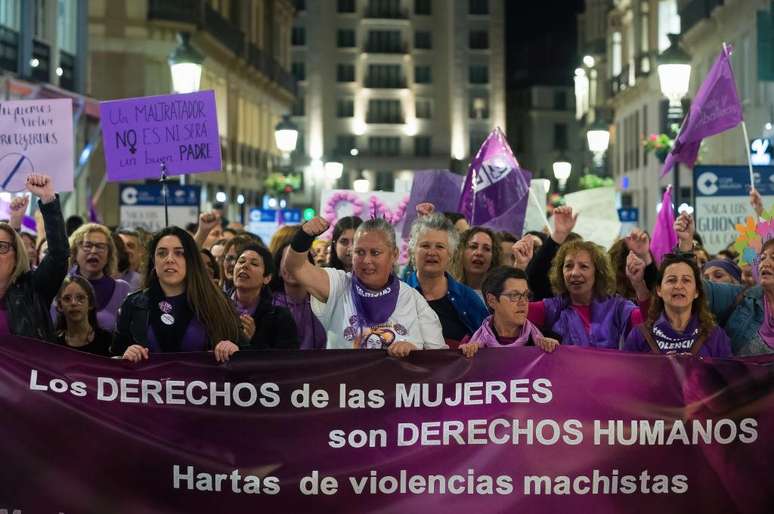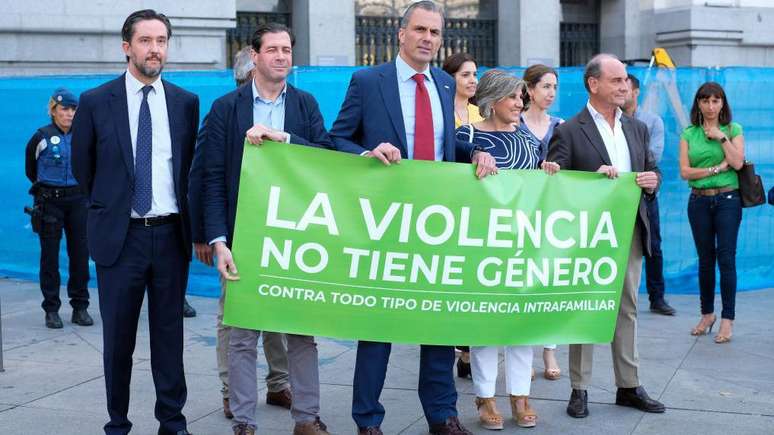Vox rejects the use of the term “gender-based violence”, stating that all victims are equal and that this issue has been politicised.
Spain’s radical right-wing Vox party has long fought to change the term ‘gender-based violence’, which it says is politicised, to ‘domestic violence’.
This change of term reopens a debate from the past, from a time when assaults and murders of women were considered a problem in the private sphere.
And the discussion occupies a central place in the campaign for the general elections of July 23 in Spain.
Vox’s efforts to change the language have intensified in recent months, especially after the acronym signed government pacts with the Popular Party (PP) in municipalities and autonomous communities such as Extremadura or the Valencian Community, the fourth most important in Spain by population.
There, Vox managed to strip away any official allusions to gender-based violence; instead, only the term “intra-family violence” is used.
Vox says violence has no gender.
“Gender is an ideological concept that we do not share,” Santiago Abascal, leader and candidate for the national government, recently said in an interview.
For Vox, “there is reprehensible violence that must be fought vehemently and it is this violence against women, children and the elderly” that Abascal has framed in the “intra-family sphere” and in the party’s goal of protecting all victims of violence without distinction — men, women, dependents, the elderly or children.

The issue was included in the electoral program presented last week by the far-right party, which says: “We will revoke the Law on Gender-based Violence and any norm derived from the theory of gender, which violates the presumption of innocence or establishes exceptions to depending on the sex of the aggressor or the victim. We will eliminate the Tribunals for Violence against Women”.
Meanwhile, the conservative PP has distanced itself from Vox by announcing: “Eradicating sexist violence and all forms of violence against women is our priority objective. We will not accept steps backwards”.
The candidate for the presidency of the PP government, Alberto Núñez Feijóo, highlighted that “gender-based violence exists and every murder of a woman shocks us as a society”.
But what is the difference between the terms?
The term “intra-family violence” is not included in any Spanish legal system.
On the contrary: there is the concept of domestic violence, which refers to violence perpetrated by any member of the family in various capacities, and which does not include women murdered outside this sphere.
Gender-based violence, on the other hand, includes all violence perpetrated against women as women.
“Gender-based violence is not a problem that affects the private sphere. On the contrary, it manifests itself as the most brutal symbol of the inequalities existing in our society”, reads the opening paragraph of the Supplementary Law against Gender-based Violence approved at the unanimously during the socialist government of José Luis Rodríguez Zapatero in 2004.
“We are dealing with violence that targets women for the very fact of being women, for being considered by their aggressors as deprived of the minimum rights of freedom, respect and decision-making capacity”, says the law, which was a pioneer in Europe and it has become a point of reference for countries such as Italy, France, Sweden or Germany.

The 2011 Council of Europe Istanbul Convention frames gender-based violence in the same sense. Even the United Nations and the World Health Organization (WHO) recognize this.
Experts insist on the importance of distinguishing between violence against women (which can be by family members or people outside the family) and what is family violence (violence which can occur by parents on children or between siblings, or in the elderly, or from women to men).
Gender-based violence can be intrafamilial or non-intrafamilial.
The statistics are also different and reveal a chasm between the practices.
According to the National Institute of Statistics (INE), 32,644 women victims of gender-based violence were registered in 2022 (8.3% more than in 2021) compared to 8,151 victims of domestic violence (1.1% less than previous year), of which 4,949 were women and 3,202 were men.

“In the beginning, the notion of gender-based violence was born in the family environment, from husband to wife, and that is why domestic violence was discussed for the first time,” explains Loria Garcia, professor of criminal law at the University of Valencia, at BBC News World.
“As we advance and evolve, the idea of domestic violence disappears and we talk about gender-based violence, violence against women, because it is not only what occurs within the couple’s relationship”.
“Our penal code punishes all actions that involve gender discrimination with a specific aggravating circumstance. It does not matter whether inside or outside the family. Institutional violence or violence by a stranger for discrimination of gender is also punished type”.
“For this reason, speaking first of intra-family violence is ignoring the fact that women also suffer violence from men who do not belong to our couple relationship. , she evaluates.
‘denying reality’
In 2022, 49 women were killed by gender-based violence in Spain. It is the second lowest annual number, along with the years 2016 and 2020, also with 49 women murdered.
In this context, Vox acknowledges that there is violence against women, but denies that it is gender-based violence and insists on not differentiating the murders.

For Miguel Lorente Acosta, government delegate for gender violence in 2008, this current “denies a reality that questions its model of society, its androcentric model”.
“Not recognizing gender-based violence is, for example, like not recognizing hepatitis B. It can be said that I will give a cure for hepatitis and, obviously, it is not effective, because there is toxic hepatitis, the metabolic hepatitis, infectious hepatitis… one requires its treatment,” Mundo told BBC News.
“Therefore, the argument is as absurd and fallacious as saying that I will treat all hepatitis equally,” says Acosta, a medical examiner and professor of forensic medicine at the University of Granada and one of the country’s top experts on gender-based violence. .
“They are different forms of violence and trying to mix them with the inability to address their specific cause is irresponsible in terms of professionalism, like when a doctor treats a disease the wrong way,” he says.
Professor Lloria García sees it the same way.
“Each type of violence has well-defined causes and it is necessary to know them in order to prevent them,” he says.
“I always give the example that when you have a fever it can be a virus or a bacterium. If it’s a bacterium I give the antibiotic, if it’s a virus I can’t give the antibiotic. Well, the same thing happens here. A death is a death, or a wound is a wound, but I need to know why it happens in order to know how to fight it and how to avoid it”.
However, repeating a message week after week can end up permeating society, acknowledges the expert.
“The farces, the alternative truths, are successful because they come to defend the current model. What reinforces what people want to believe, need to believe, is accepted. After all, denial is an ideological position,” says Lorente.
“I cannot accept gender-based violence because if I accept that there is a socio-cultural construction whereby men minimize, normalize, justify the use of violence against women, then I have to question many things. It is more comfortable to say that it is an ideological invention, which even women mistreat or which women falsely denounce”.

But for Vox the term change does not mean reducing protection for women. The party supports increased sentences, including life imprisonment.
The use of the term domestic violence assumes “that violence can be generated in emotional relationships, and the victim, who is often a woman, as is true, will be better protected with tougher sanctions by governments with the participation of Vox” , said José María Llanos , deputy spokesperson for Vox in the Valencian parliament.
However, Vox leader Santiago Abascal told the Antena3 television network this week that the global gender-based violence law was “served to criminalize men” and “not to protect women.”
According to him, “the number of murdered women has not decreased with this law.”
What can change?
Spain’s law on gender-based violence has been challenged about 200 times in the courts, mainly because men find it very difficult to defend themselves against unfounded accusations or those that violate the principle of equality. However, its constitutionality was ratified by the Constitutional Court in 2008.
Repealing it as Vox wants would require an absolute majority in Congress.
Although the repeal of the law is unlikely, what Vox is already doing in cities such as Valladolid, Burgos or Toledo, among others, is the elimination of the Parity departments, which are being replaced by those of the Family.
What does it mean? For Paz Lloria García, more than a name change that can be important for its symbolic value, it can lead to a decrease in funding for instruments that depend on regional or municipal governments, such as the 24-hour Women’s Center or others that help protect women.
“The norm does not only contain criminal aspects, but the norm, like the rest of the transversal norms that we have, contains many aspects of other branches of the legal system, for example, labor rights or social, preventive and educational aspects” , says the specialist.
Source: Terra
Rose James is a Gossipify movie and series reviewer known for her in-depth analysis and unique perspective on the latest releases. With a background in film studies, she provides engaging and informative reviews, and keeps readers up to date with industry trends and emerging talents.



![Tomorrow belongs to us: What awaits you on Thursday, 2014, in the episode of August 21, 2025 [SPOILERS] Tomorrow belongs to us: What awaits you on Thursday, 2014, in the episode of August 21, 2025 [SPOILERS]](https://fr.web.img4.acsta.net/img/f3/67/f367cef67259314e71fe2cb3ee784be4.jpg)


